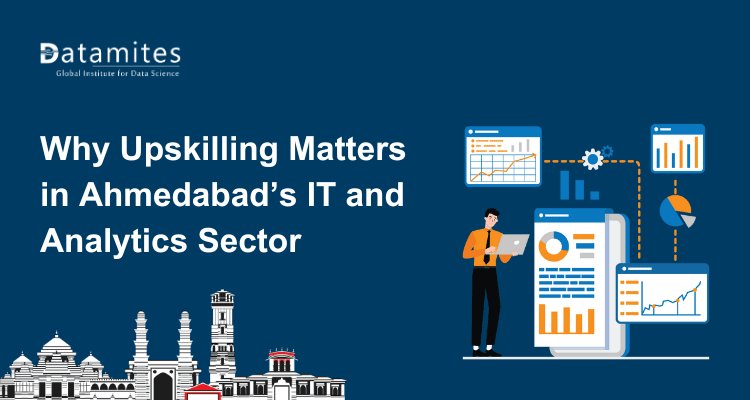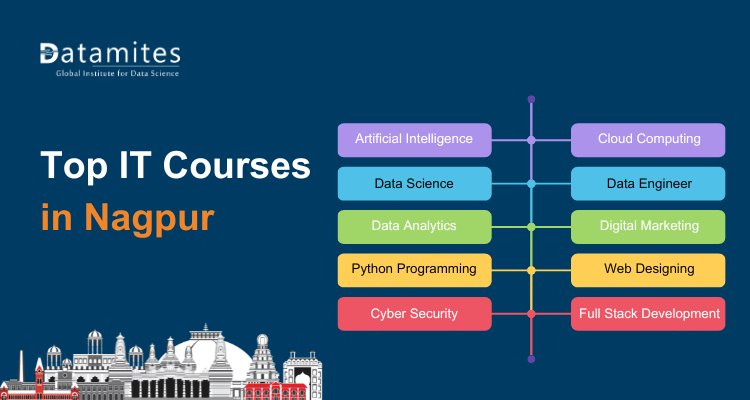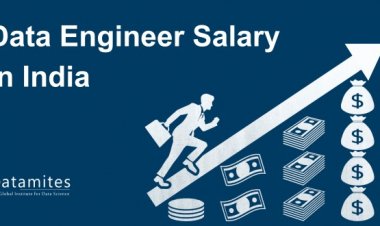Guide to Data Analyst Career
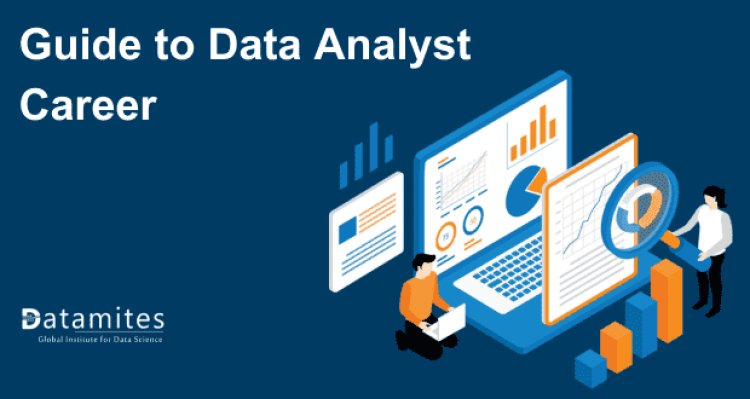
Data analysis is a rapidly growing field that involves extracting insights from data to inform decision-making in various industries. It combines statistical skills, domain knowledge, and technical expertise to turn data into actionable intelligence. Data analysts play a crucial role in interpreting complex data sets to help organizations make informed strategic decisions.
In 2022, the Data Analytics Market was valued at USD 41.74 billion, as per findings from a report conducted by Maximise Market Research. This market is predicted to grow at a rate of 29.47% from 2023 to 2029. By the end of this period, the total revenue generated by the Data Analytics sector is expected to be around USD 245.53 billion.
In this article, we will cover the essential skills, educational paths, and career progression opportunities for aspiring data analysts. We'll also discuss the latest trends and tools in the field, providing a comprehensive guide for those looking to start or advance their career in data analysis.
Deciphering the World of Data Analytics: Insights and Trends
Data analytics involves interpreting complex datasets to extract meaningful insights. It's about using statistical tools and algorithms to identify trends, patterns, and relationships within data. This process is essential for informed decision-making in various fields, from business to science.
According to a study conducted by Precedence Research, the worldwide data analytics market, with a worth of $30 billion in 2022, is forecasted to achieve approximately $393.35 billion by 2032. This market is anticipated to expand at a compound annual growth rate of 29.4% from 2023 to 2032.
In terms of popularity, data analytics has become increasingly vital in today's data-driven world. Its applications span multiple industries, making it a sought-after skill in the job market and a pivotal tool in technological advancements.
Refer these articles:
- Exploring Data Analyst Job Opportunities and Salaries Worldwide
- How to Become A Data Analyst
- Guide to Data Analytics Career
What is the current condition of the data analytics sector as of 2023?
As of 2023, the data analytics sector is experiencing robust growth and significant evolution. Key trends include:
- Increased Demand for Skilled Professionals: There's a growing need for data scientists and analysts with advanced skills in data processing, machine learning, and statistical analysis.
- Advancements in AI and Machine Learning: These technologies are becoming more integrated into data analytics, enhancing the ability to process and interpret large datasets.
- Rise of Big Data: The volume of data generated by businesses and individuals continues to grow exponentially, driving demand for more sophisticated data analytics solutions.
- Focus on Data Privacy and Security: With increased data breaches and stringent data privacy regulations like GDPR, companies are investing more in securing their data.
- Cloud-Based Analytics: The shift towards cloud platforms continues, offering more scalable and flexible data analytics solutions.
- Increased Use of Predictive Analytics: Businesses leverage predictive analytics to forecast and make strategic decisions.
Data Analytics Demand: A Growing Trend
The demand for data analytics is rapidly growing across various industries, reflecting a significant trend in the business world. This surge is driven by the increasing recognition of data as a critical asset for decision-making, strategic planning, and maintaining a competitive edge.
- Healthcare: In the healthcare industry, data analytics is revolutionizing patient care and treatment outcomes. By analyzing large datasets, healthcare providers can predict patient trends, improve diagnostic accuracy, and personalise treatments. The integration of data analytics in healthcare also supports better resource management and operational efficiency.
- Finance and Banking: The finance sector is leveraging data analytics for risk assessment, fraud detection, customer segmentation, and personalized banking services. Financial institutions are enhancing their product offerings and optimizing their marketing strategies by understanding customer behaviour through data.
- Retail and E-commerce: Retailers and e-commerce platforms use data analytics to understand consumer preferences, optimize supply chains, and create targeted marketing campaigns. This data-driven approach helps in enhancing customer experience, increasing sales, and predict market trends.
- Manufacturing: In manufacturing, data analytics is employed for predictive maintenance, quality control, and optimizing production processes. By analyzing data from machines and production lines, manufacturers can reduce downtime, improve efficiency, and innovate in product development.
- Technology and Telecommunications: These industries use data analytics for network optimization, customer retention strategies, and product innovation. The insights gained from data analytics are pivotal in driving technological advancements and staying ahead in a highly competitive market.
- Transportation and Logistics: Data analytics in transportation and logistics aids in route optimization, fleet management, and demand forecasting. This results in decreased operational expenses, quicker delivery times, and heightened customer satisfaction.
- Energy and Utilities: In this sector, data analytics is crucial for grid management, demand forecasting, and sustainable energy development. The insights help in optimizing energy distribution, reducing waste, and planning for future energy needs.
Read these articles:
Exploring Career Paths in Data Analytics: A Guide to Job Roles and Responsibilities
Data analytics encompasses a range of job positions, each with distinct responsibilities and skill requirements. According to the U.S. Bureau of Labor Statistics, the employment outlook for market research analysts, which includes data analysts, is projected to expand rapidly by 22% from 2020 to 2030. This growth rate is notably quicker than the average for all job categories.
Here are some common titles in the data analytics field, along with brief descriptions of new roles and responsibilities that have emerged in recent years:
Data Analyst
Responsibilities:
- Collecting, cleaning, and analyzing data to identify trends and patterns.
- Creating reports and dashboards to present findings to stakeholders.
- Collaborating with teams to make data-driven decisions.
- Developing and maintaining databases.
Business Intelligence (BI) Analyst
Responsibilities:
- Using BI tools to transform raw data into actionable insights.
- Designing and developing dashboards and reports.
- Collaborating with business stakeholders to understand their needs.
- Identifying key performance indicators (KPIs) and monitoring business metrics.
Data Scientist
Responsibilities:
- Developing and implementing machine learning models.
- Examining intricate data sets to derive valuable insights.
- Building predictive models and algorithms.
- Working with big data technologies and programming languages like Python or R.
Data Engineer
Responsibilities:
- Designing, constructing, installing, and maintaining data architecture.
- Building data processing systems.
- Integrating data from various sources.
- Optimizing data workflows for efficiency.
Data Architect
Responsibilities:
- Designing and creating data systems and structures.
- Defining data standards and ensuring data quality.
- Collaborating with stakeholders to understand data requirements.
- Overseeing the implementation of database solutions.
Data Manager
Responsibilities:
- Managing data throughout its lifecycle.
- Ensuring data security and compliance with regulations.
- Developing and implementing data policies.
- Overseeing data governance practices.
Quantitative Analyst
Responsibilities:
- Applying statistical methods to analyze financial or market data.
- Developing mathematical models for forecasting and risk management.
- Providing insights for investment decisions.
- Collaborating with finance and trading teams.
Healthcare Data Analyst
Responsibilities:
- Analyzing healthcare data to improve patient outcomes.
- Identifying trends in healthcare utilization and costs.
- Working with electronic health records (EHR) and healthcare databases.
- Supporting decision-making in healthcare organizations.
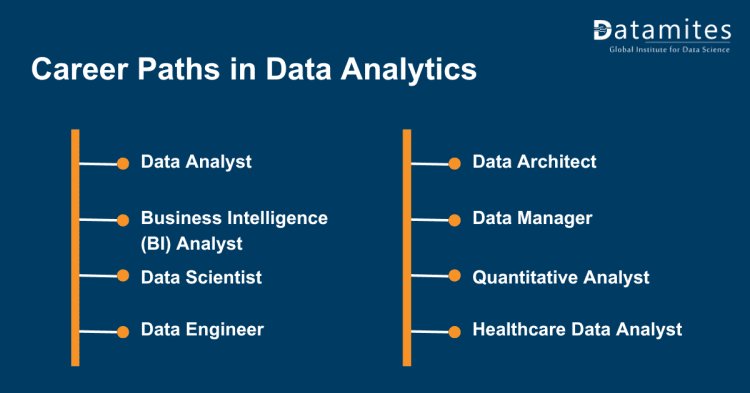
Essential Qualifications and Skills for a Career in Data Analytics
To become a data analyst, one typically needs a combination of educational qualifications and specific skills:
Educational Qualifications:
- Bachelor's Degree: A bachelor's degree is typically a prerequisite for most data analyst roles. Preferred fields of study often include statistics, mathematics, computer science, economics, or a related field.
- Relevant Coursework: Courses in statistics, data analysis, and data visualization are particularly valuable. Knowledge in specific domains related to the industry you're interested in can also be beneficial when pursuing a data analytics course.
Technical Skills:
- Statistical Analysis: Understanding statistical theories and methods is crucial for interpreting data.
- Programming Languages: Proficiency in languages like Python or R, which are widely used for data analysis.
- Database Management: Familiarity with database languages such as SQL, for retrieving and manipulating data.
Analytical Skills:
- Data Visualization: Ability to present data in a clear, understandable manner using tools like Tableau or Power BI.
- Critical Thinking: The ability to think critically and analyze data to find trends and solve problems.
- Attention to Detail: Precision is key in data analysis to ensure the accuracy of findings.
Soft Skills:
- Communication Skills: Strong verbal and written communication skills are essential to present findings effectively.
- Problem-Solving Ability: The capacity to approach complex problems and devise practical solutions.
- Teamwork and Collaboration: Often, data analysts work in teams and must collaborate effectively with others.
Experience:
- Internships or Projects: Practical experience, even at an entry level or through academic projects, is highly valued.
Pathways in Data Analysis: Your Comprehensive Career Guide
Embarking on a Data Analyst Career involves a structured pathway with several key steps. Here is a roadmap to lead you through the process:
Educational Foundation:
- Start with a Relevant Degree: Most data analysts have a bachelor’s degree in fields like statistics, mathematics, economics, computer science, or information technology. An advanced position can benefit from the acquisition of a master's degree.
Learn the Basics:
- Understand Core Principles: Gain a solid understanding of data analysis basics, including statistical analysis, data mining, and data visualization. Online resources, books, and tutorials are excellent ways to start.
Technical Skills Development:
- Master Key Software and Languages: Proficiency in tools like SQL for database management, Excel for data manipulation, and programming languages like Python or R is crucial. Get acquainted with data visualization tools like Tableau or Power BI.
Mathematics and Statistics Proficiency:
- Deepen Math and Stats Knowledge: A strong foundation in statistics and mathematics is essential for analyzing and interpreting data effectively.
Practical Application and Projects:
- Engage in Hands-On Projects: Apply your skills through practical projects. Analyse datasets, participate in online competitions and contribute to collaborative projects. Building a portfolio showcasing your work is key for employment opportunities.
Professional Development:
- Enrol in Specialized Courses and Certifications: Join courses and gain certifications to enhance your skills and credentials.
Stay Informed and Updated:
- Keep Up with Industry Trends: Data analysis is a dynamic field. Stay informed about the latest tools, techniques, and best practices through blogs, webinars, and industry conferences.
Gain Real-World Experience:
- Seek Internships and Entry-Level Positions: Practical experience is invaluable. Look for internships or junior data analyst positions to apply your skills in a real-world setting.
Prepare for Interviews:
- Ready Yourself for Technical Interviews: Be prepared for interviews that may include practical data analysis exercises, case studies, and discussions on data analysis concepts.
Specialisation:
- Choose a Focus Area: As you grow, specialize in areas like business intelligence, big data, machine learning, or specific industries like finance or healthcare.
Career Growth:
- Aim for Advanced Roles: With experience, aim for senior data analyst roles, data scientist positions, or consider roles in data management or analytics consulting.
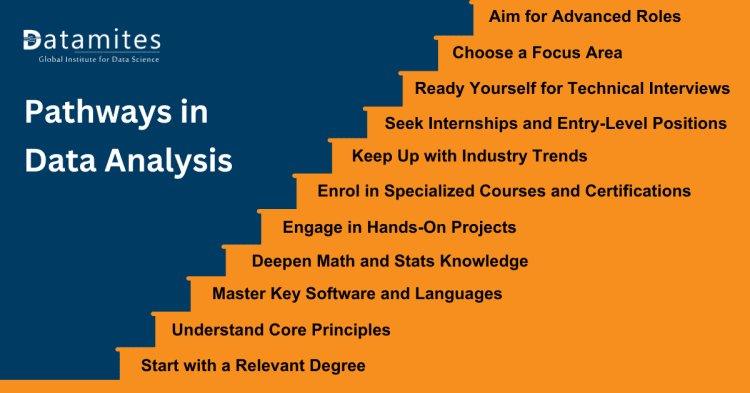
Worldwide Data Analyst salaries:
- The salary of a data analyst in the USA ranges from USD 76,751 per year according to an Indeed report.
- The salary of a data analyst in the UK ranges from GBP 37,622 per year according to an Indeed report.
- The salary of a data analyst in India ranges from INR 5,85,330 per year according to an Indeed report.
- The salary of a data analyst in Canada ranges from CAD 67,363 per year according to an Indeed report.
- The salary of a data analyst in Australia ranges from AUD 95,421 per year according to an Indeed report.
- The salary of a data analyst in Saudi Arabia ranges from SAR 1,75,000 per year according to a Salary Expert report.
- The salary of a data analyst in South Africa ranges from ZAR 325088 per year according to an Indeed report.
- The salary of a data analyst in Switzerland ranges from CHF 1,03,251 per year according to a Glassdoor report.
- The salary of a data analyst in Germany ranges from EUR 60,300 per year according to a Glassdoor report.
- The salary of a data analyst in UAE ranges from AED 80,659 per year according to an Indeed report.
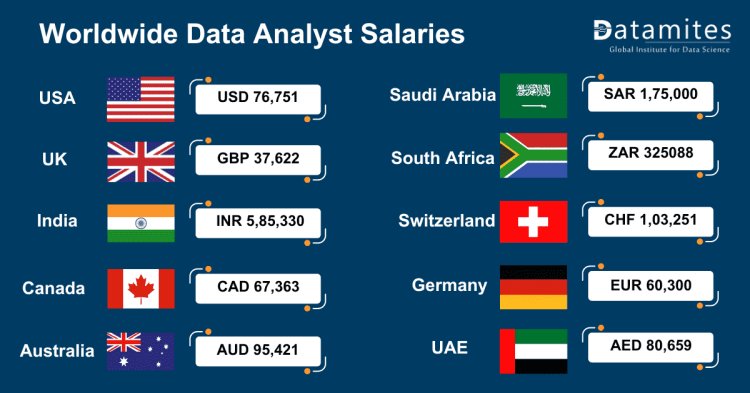
Factors Influencing Salaries in the Data Analyst Profession
Several factors influence the salaries of data analysts. These factors can vary based on geographic location, industry, and other criteria. Here are some key factors:
Experience and Education: Generally, more experienced data analysts with advanced degrees or specialized certifications tend to earn higher salaries. Entry-level positions may pay less, but salary increases with experience and additional education or certifications.
Industry: The industry in which a data analyst works can significantly impact their salary. For instance, data analysts in finance, technology, or healthcare industries may earn more due to the high demand and specialized knowledge required in these fields.
Location: Geographic location plays a crucial role. Data analysts in cities with a higher cost of living, like San Francisco or New York, usually earn more than those in smaller cities or rural areas. Countries with a strong tech sector also often offer higher salaries for data analysts.
Company Size and Type: Larger corporations or well-funded tech startups might offer higher salaries compared to smaller companies or non-profits. The financial health and revenue of the company can also impact salary levels.
Skills and Specialization: Certain skills, such as proficiency in specific programming languages (like Python or R), experience with big data technologies, or expertise in machine learning, can command higher salaries. Specialisation in a high-demand area of data analysis can also lead to increased earning potential.
Refer these articles:
- Data Analyst Course Fee in Bangalore
- Data Analyst Course Fee in Chennai
- Data Analyst Course Fee in Hyderabad
Data Analysts: Shaping the Future
The future of data analysts looks promising as businesses continue to recognize the importance of data-driven decision-making. Data analysts will play a pivotal role in extracting valuable insights from ever-increasing volumes of data, leveraging advanced analytics, machine learning, and AI tools. Additionally, data privacy and ethical considerations will become more critical, requiring data analysts to navigate complex regulatory landscapes. Continuous upskilling and adaptability will be key for data analysts to stay relevant in this rapidly evolving field.
A career in data analysis provides an exciting and fulfilling journey for individuals enthusiastic about uncovering valuable insights from data. With the ever-increasing demand for data-driven decision-making in various industries, data analysts play a crucial role in shaping business strategies and driving growth. The field offers ample opportunities for growth and specialization, making it an appealing choice for individuals with strong analytical and problem-solving skills.
DataMites, a renowned institute, is at the forefront of providing excellent data analytics training. These courses also come with prestigious certifications from IABAC and NASSCOM FutureSkills, ensuring that students receive top-quality data analytics education. For individuals seeking online and classroom data analytics courses, DataMites stands as a reliable and easily accessible choice to kickstart a promising career in this booming industry.

